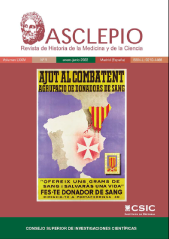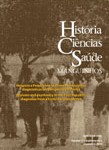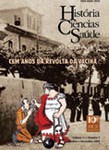June 2020
Vivian Mannheimer* | HCS-Manguinhos blog
In the book Making Health Public, published in 2016, political communication scholar Daniel Hallin and Anthropologist Charles Briggs examine news coverage of health issues in the United States. They make a case for the importance of health news not merely for the transmission of health information, but for the formation of fundamental concepts of health and disease.

Daniel Hallin, Distinguished Professor of Communication at the University of California. He is the author (with Paolo Mancini) of the awarded book Comparing Media Systems: Three Models of Media and Politics (2004).
In this interview Daniel Hallin compares the media coverage of Covid-19 and the 2009 H1N1 pandemic, talks about the possible consequences of this crisis for the upcoming US presidential elections and highlights some similarities between the fields of Communication and Medical Humanities.
In your book “Making Health Public” one of the chapters focuses on the 2009 H1N1 pandemic. How can we compare the news coverage of H1N1 and Covid-19 in terms of misinformation, discourses and framings?
This pandemic now is, of course, much bigger than the earlier ones. In our book we look at the so-called swine flu pandemic in 2009. The H1N1 and the current pandemic were very similar in the beginning, but H1N1 turned out to be very much milder than the health officials thought. It never became as complicated a story as this one.
The other thing I would say that is really different is that the coronavirus crisis takes place in the U.S in a very different political context. In the case of the H1N1 crisis in 2009 Obama was the president and he was willing to defer to the public health officials and let them lead the communication with the mass public, and all that went very, very smoothly. Now we have Trump, who wants to be the center of attention and is very suspicious of scientists and bureaucrats within the government and his mode of operation is different.
Normally in the US, historically, we would expect the President to play the role of unifying the nation in the case of a crisis like this. But this is not a role that Trump understands and is comfortable with. So, Trump continues to follow a political strategy of polarization. So, that makes this crisis very different in terms of the circulation of information.
In a recent interview you said that usually in epidemics we see conservative discourses, such as that this virus is overhyped, that China is responsible for spreading it, prejudice against immigrants. How do you see it now in the US?
We see them particularly in conservative media, this means FOX News, most importantly, but of course we see them also in other conservative media and in Trump’s discourse. One of the important things for example is that Trump has insisted in referring to this as the Chinese virus, putting the blame on China. One problem is that there are lots of Asian immigrants in the United States and lots of hostile acts that result from this kind of discourse.
These are kinds of things that public health officials always avoid, this kind of stigmatization of particular populations or the effort to look for someone to blame, because it has no value in actually managing the crisis. All it does is inject politics into it.
And for this reason, for the most part the mainstream media avoids these discourses in the United States, but they do circulate in conservative media and in social media.
In the book you focus on the concept of biomediatization to argue that the production of health news has a fundamental role in constructing people’s understandings of health and disease. Can you explain the term?

Most recently, Hallin has been doing research on health and medical reporting and the mediatization of health and medicine, working with the Berkeley Anthropologist Charles Briggs.
This was the first time I did something related to health and it was interesting to learn the literatures of history of medicine, medical sociology and medical anthropology.
I worked on that book with a medical anthropologist (Charles Briggs, a professor in the Department of Anthropology at UC Berkeley).
I read the literatures on medicalization and biomedicalization and they argue that more and more biomedicine kind of colonizes other parts of society, that it has a very powerful cultural influence on other parts of society. I find it very interesting because this is very much like the way we talk about mediatization, in media studies, which is a very similar argument about how media colonize other social fields and how other social fields have to defer to media logic.
On the surface they seem to be incompatible theories. So, my co-author and I were interested in thinking on how you can reconcile them and we make an argument in the book that they are actually both true and interrelated.
If biomedicine is expanding its influence in society, it does so to a large extent through media. You can see in the current crisis – people turning increasingly to the media, the media with a very high profile role. And that is partially because the media is where they encounter the biomedical knowledge they want to know.
So, by the term biomediatization we are talking about the combination of these two things that go together and we are making an argument about how health news is co-produced by biomedical researchers and authorities and by media personnel and we look very closely at the interrelations and interdependencies between them.
When we studied the swine flu pandemic one thing that was really interesting to see was how much the public health authorities depended on communication and on communication specialists.
And at the same time, we were struck by how much the journalists were part of the world of biomedicine. They were very close to public health officials, thought like public health officials, talked in very similar ways and they were really insiders to that community. So, that is the kind of thing we mean by this combination of biomedicalization and mediatization.
Do you think that the Covid crisis brought some kind of debate about the US healthcare system in the United States? Can you see it in the media?
Because the immediate crisis has pushed everything out of the agenda, a lot of those discussions have gone away. They appear occasionally but they are not very prominent.
We were having big debates during the primary election campaign about medicare for all, which means an expansion of public funding for healthcare, moving to a direction of a more European style system. But this disappeared for the moment, partially because the election is now off the agenda. But I think that in the wake of this crisis, as it starts to wind down and also as the election approaches in November, yes, it will have a lot of effect on that discussion and I am not sure in what direction it will go, but I think that it will.
It certainly dramatizes a lot of the limitations of our health system and there are a lot of related issues, some which have been discussed more. For example, important discussions on sick leaves for workers, as in the U.S, unlike in the European countries, many workers don’t have any right to take paid time off when they are sick. That has been discussed and there were changes and emergency measures. But I am sure that there will be important discussions after the crisis is over about whether this kind of policy should stay.
What kind of impact can this crisis have on the next election? Or is it too early to think about it?
It is early to tell but I can speculate. I think that it can go in different ways. Normally a crisis helps whoever is in power. The normal phenomenon we find in the United States is what we call the “rally-round-the-flag” effect. Whenever there is a crisis people look to the president’s leadership and the president’s popularity goes up. It happened a little bit in the beginning and then it began to fall.
Certainly it has been possible for Trump to do that. He has a daily press briefing. He is able to steal the spotlight even more than before. On the other hand, it undercuts in some ways his ability to control what the issues are.
He would normally want the election to be fought on issues related to immigration, taxes and things like that. If health is the main issue in the elections, that is not going to help him, I think. And the economy is very bad. The kind of economic issues that come to the fore now are different kinds of economic issues. There are arguments to be made certainly that it will hurt Trump and the public reaction to Trump’s management of the crisis is not very strong, compared, for example, to a lot of the governors.
In Brazil, as well as in the USA and other places, the press, as an institution, is being systematically attacked and discredited. But in this current health crisis, specifically in the beginning, we could see a shift, people looking to the media as a reliable source of information. Can you see a similar trend in the US? Is this something specific of this moment or can be a lasting trend?
This is happening also in the U.S at the moment. People are looking more to the mainstream media for information and the level of trust is going up. That is definitely true. At the same time, the crisis is hurting media economically, because even though their audiences are up, advertising revenues are down, because the businesses are not advertising. It is particularly striking for a lot of the smaller news organizations in the US. A lot of them are going out of business now because advertising is disappearing. We will have to wait and see, but maybe we will see a little shift, people trusting mainstream media more, something closely related to a move away from a populist, anti-science, anti-experts, post-truth kind of culture that we moved into in recent years.
* PHD candidate in Communication at PuC-Rio (PPGCOM) and member of COMP, The Communication and Politics Study Group at PUC-Rio.
How to cite this post:
HALLIN, D. Media, politics and health: An interview with Daniel Hallin. In: Revista História, Ciências, Saúde – Manguinhos (Blog). Published on June, 1th, 21 2020. Accessed in [date].
See in HCS-Manguinhos:
Call for papers: History of science communication – This special issue will explore the changing landscape of science communication.
Science Communication in the Age of Social Media – Editors discuss the potential of social media for scientific journals .
What has science communication ever done for us?
This article argues that there’s been a revolution in the way researchers think about science and engagement.
The importance of science communication in public health development – New issue of Ciência & Saúde Coletiva discusses the importance of scientific publication in the development of public health.
Fiocruz awarded on science communication – The annual award is destined towards projects that contribute to make science, technology and innovation available for a broad audience.









